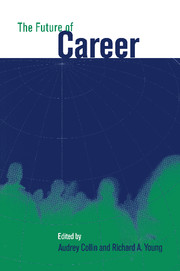Book contents
- Frontmatter
- Contents
- Notes on contributors
- Acknowledgements
- 1 Introduction: framing the future of career
- Part 1 Changing contexts
- 2 ‘Fracture lines’ in the career environment
- 3 Some contributions of sociology to the understanding of career
- 4 Renovating the psychology of careers for the twenty-first century
- 5 Changing career: the role of values
- 6 Dancing to the music of time
- Part 2 New perspectives
- Part 3 New directions for theory, practice and policy
- Author index
- Subject index
5 - Changing career: the role of values
Published online by Cambridge University Press: 06 January 2010
- Frontmatter
- Contents
- Notes on contributors
- Acknowledgements
- 1 Introduction: framing the future of career
- Part 1 Changing contexts
- 2 ‘Fracture lines’ in the career environment
- 3 Some contributions of sociology to the understanding of career
- 4 Renovating the psychology of careers for the twenty-first century
- 5 Changing career: the role of values
- 6 Dancing to the music of time
- Part 2 New perspectives
- Part 3 New directions for theory, practice and policy
- Author index
- Subject index
Summary
The changing work place – a combination of economic, demographic, technological, and social changes – continues to have far-reaching effects on work, family, and other life roles of individuals. Changing definitions of career reflect the complex combination of work and nonwork roles which are increasingly a feature of life (Collin & Watts, 1996; Super, 1990; Watts, 1997). These definitions incorporate the themes of multiple roles and individual responsibility for career. Super (1980, p. 282) referred to the ‘combination and sequence of roles played by a person during the course of a lifetime’. More recent definitions emphasise that individuals must review their perception of their career as an individual rather than organisational phenomenon – ‘individuals should regard themselves as being self-employed’ (Collin & Watts, 1996, p. 391). Changes in the future of career – in the way individuals engage in society through work – and in its relationship with other life roles prompt a re-examination of values and personal meanings in role involvement.
Most writers would agree that the meaning we ascribe to values is constructed within the contexts in which we live (e.g. Gergen, 1985; Nord, Brief, Atieh, & Doherty, 1990). Our values and the meanings we attach to life roles change in concert with changes in culture and society, but the extent to which this happens is unclear (Kopper, 1993). In a post-traditional context, Giddens (1991) suggests that the radical alteration in the way we engage with society individually and collectively, so that individual and society reflexively interact, encourages a construction of a narrative of self-identity so that the self becomes a reflexive project. He notes that ‘the altered self has to be explored and constructed as part of a reflexive process of connecting personal and social change’ (p. 33).
- Type
- Chapter
- Information
- The Future of Career , pp. 69 - 82Publisher: Cambridge University PressPrint publication year: 2000
- 19
- Cited by

